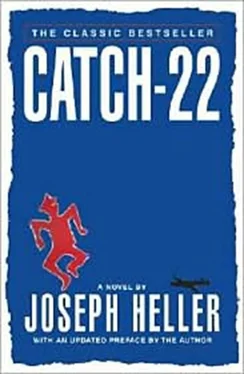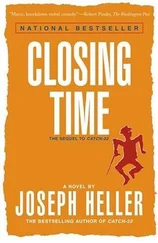“How was trump at Munich?”
“Ho-ho beriberi.”
and
“Balls!”
all rang out in rapid succession, and then there was Yossarian with the question that had no answer:
“Where are the Snowdens of yesteryear?”
The question upset them, because Snowden had been killed over Avignon when Dobbs went crazy in mid-air and seized the controls away from Huple.
The corporal played it dumb. “What?” he asked.
“Where are the Snowdens of yesteryear?”
“I’m afraid I don’t understand.”
“ Où sont les Neigedens d’antan ?” Yossarian said to make it easier for him.
“ Parlez en anglais, for Christ’s sake,” said the corporal. “ Je ne parle pas français .”
“Neither do I,” answered Yossarian, who was ready to pursue him through all the words in the world to wring the knowledge from him if he could, but Clevinger intervened, pale, thin, and laboring for breath, a humid coating of tears already glistening in his undernourished eyes.
Group Headquarters was alarmed, for there was no telling what people might find out once they felt free to ask whatever questions they wanted to. Colonel Cathcart sent Colonel Korn to stop it, and Colonel Korn succeeded with a rule governing the asking of questions. Colonel Korn’s rule was a stroke of genius, Colonel Korn explained in his report to Colonel Cathcart. Under Colonel Korn’s rule, the only people permitted to ask questions were those who never did. Soon the only people attending were those who never asked questions, and the sessions were discontinued altogether, since Clevinger, the corporal and Colonel Korn agreed that it was neither possible nor necessary to educate people who never questioned anything.
Colonel Cathcart and Lieutenant Colonel Korn lived and worked in the Group Headquarters building, as did all the members of the headquarters staff, with the exception of the chaplain. The Group Headquarters building was an enormous, windy, antiquated structure built of powdery red stone and banging plumbing. Behind the building was the modern skeet-shooting range that had been constructed by Colonel Cathcart for the exclusive recreation of the officers at Group and at which every officer and enlisted man on combat status now, thanks to General Dreedle, had to spend a minimum of eight hours a month.
Yossarian shot skeet, but never hit any. Appleby shot skeet and never missed. Yossarian was as bad at shooting skeet as he was at gambling. He could never win money gambling either. Even when he cheated he couldn’t win, because the people he cheated against were always better at cheating too. These were two disappointments to which he had resigned himself: he would never be a skeet shooter, and he would never make money.
“It takes brains not to make money,” Colonel Cargill wrote in one of the homiletic memoranda he regularly prepared for circulation over General Peckem’s signature. “Any fool can make money these days and most of them do. But what about people with talent and brains? Name, for example, one poet who makes money.”
“T. S. Eliot,” ex-P.F.C. Wintergreen said in his mail-sorting cubicle at Twenty-seventh Air Force Headquarters, and slammed down the telephone without identifying himself.
Colonel Cargill, in Rome, was perplexed.
“Who was it?” asked General Peckem.
“I don’t know,” Colonel Cargill replied.
“What did he want?”
“I don’t know.”
“Well, what did he say?”
“’T. S. Eliot,’” Colonel Cargill informed him.
“What’s that?”
“’T. S. Eliot,’” Colonel Cargill repeated.
“Just ‘T. S.’-“
“Yes, sir. That’s all he said. Just ‘T. S. Eliot.’”
“I wonder what it means,” General Peckem reflected. Colonel Cargill wondered, too.
“T. S. Eliot,” General Peckem mused.
“T. S. Eliot,” Colonel Cargill echoed with the same funereal puzzlement.
General Peckem roused himself after a moment with an unctuous and benignant smile. His expression was shrewd and sophisticated. His eyes gleamed maliciously. “Have someone get me General Dreedle,” he requested Colonel Cargill. “Don’t let him know who’s calling.”
Colonel Cargill handed him the phone.
“T. S. Eliot,” General Peckem said, and hung up.
“Who was it?” asked Colonel Moodus.
General Dreedle, in Corsica, did not reply. Colonel Moodus was General Dreedle’s son-in-law, and General Dreedle, at the insistence of his wife and against his own better judgment, had taken him into the military business. General Dreedle gazed at Colonel Moodus with level hatred. He detested the very sight of his son-in-law, who was his aide and therefore in constant attendance upon him. He had opposed his daughter’s marriage to Colonel Moodus because he disliked attending weddings. Wearing a menacing and preoccupied scowl, General Dreedle moved to the full-length mirror in his office and stared at his stocky reflection. He had a grizzled, broad-browed head with iron-gray tufts over his eyes and a blunt and belligerent jaw. He brooded in ponderous speculation over the cryptic message he had just received. Slowly his face softened with an idea, and he curled his lips with wicked pleasure.
“Get Peckem,” he told Colonel Moodus. “Don’t let the bastard know who’s calling.”
“Who was it?” asked Colonel Cargill, back in Rome.
“That same person,” General Peckem replied with a definite trace of alarm. “Now he’s after me.”
“What did he want?”
“I don’t know.”
“What did he say?”
“The same thing.”
“’T. S. Eliot’?”
“Yes, ‘T. S. Eliot.’ That’s all he said.” General Peckem had a hopeful thought. “Perhaps it’s a new code or something, like the colors of the day. Why don’t you have someone check with Communications and see if it’s a new code or something or the colors of the day?”
Communications answered that T. S. Eliot was not a new code or the colors of the day.
Colonel Cargill had the next idea. “Maybe I ought to phone Twenty-seventh Air Force Headquarters and see if they know anything about it. They have a clerk up there named Wintergreen I’m pretty close to. He’s the one who tipped me off that our prose was too prolix.”
Ex-P.F.C. Wintergreen told Cargill that there was no record at Twenty-seventh Air Force Headquarters of a T. S. Eliot.
“How’s our prose these days?” Colonel Cargill decided to inquire while he had ex-P.F.C. Wintergreen on the phone. “It’s much better now, isn’t it?”
“It’s still too prolix,” ex-P.F.C. Wintergreen replied.
“It wouldn’t surprise me if General Dreedle were behind the whole thing,” General Peckem confessed at last. “Remember what he did to that skeet-shooting range?”
General Dreedle had thrown open Colonel Cathcart’s private skeet-shooting range to every officer and enlisted man in the group on combat duty. General Dreedle wanted his men to spend as much time out on the skeet-shooting range as the facilities and their flight schedule would allow. Shooting skeet eight hours a month was excellent training for them. It trained them to shoot skeet.
Dunbar loved shooting skeet because he hated every minute of it and the time passed so slowly. He had figured out that a single hour on the skeet-shooting range with people like Havermeyer and Appleby could be worth as much as eleven-times-seventeen years.
“I think you’re crazy,” was the way Clevinger had responded to Dunbar’s discovery.
“Who wants to know?” Dunbar answered.
“I mean it,” Clevinger insisted.
“Who cares?” Dunbar answered.
“I really do. I’ll even go so far as to concede that life seems longer I-“
“-is longer I-“
Читать дальше












